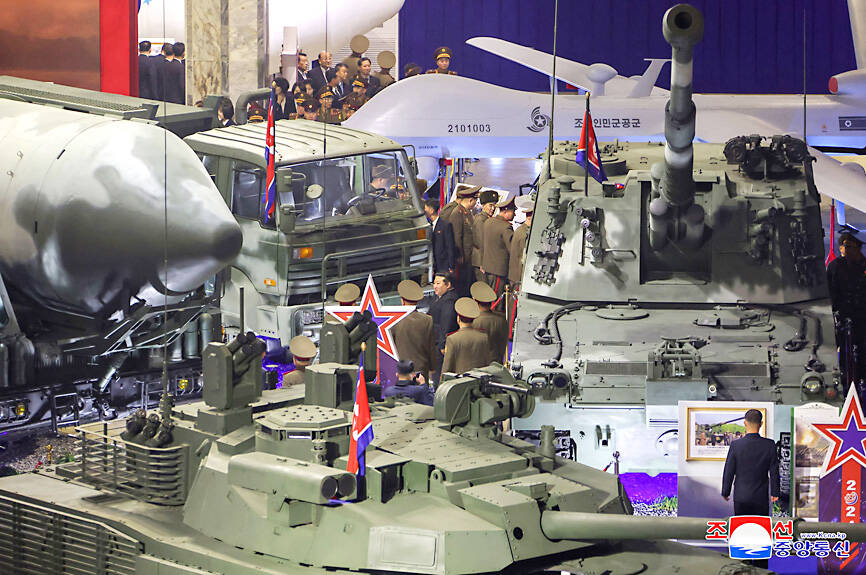Russia provided North Korea with oil, anti-air missiles and economic help in exchange for troops to support Moscow’s war on Ukraine, government officials and a research group said yesterday.
The US and South Korea have accused the nuclear-armed North of sending more than 10,000 soldiers to help Russia fight Ukraine, with experts saying North Korean leader Kim Jong-un was eager to gain advanced technology and battle experience for his troops, in return.
Asked what Seoul believes the North has received for the deployment, South Korea’s top security adviser Shin Won-sik said: “It has been identified that equipment and anti-aircraft missiles aimed at reinforcing Pyongyang’s vulnerable air defense system have been delivered to North Korea.”

Photo: KCNA VIA KNS / AFP
Speaking to local broadcaster SBS, Shin added that North Korea has received “various forms of economic support.”
Lee Illwoo, an expert with the Korea Defense Network in South Korea, said that Russia has likely sent S-400 long-range surface-to-air missiles, launchers and ground-based radar systems.
He said that North Korea is capable of building shorter-range surface-to-air missiles on its own.
The S-400 missile, with a range of 400km, is considered one of Russia’s most advanced anti-aircraft weapons. However, Lee questioned how significantly it can boost Pyongyang’s air defense, saying Russian air defense systems have failed to effectively deal with Ukrainian drone assaults.
Separately, non-profit research group Open Source Centre said Pyongyang obtained oil shipments from Russia.
It cited satellite images showing that more than a dozen North Korean oil tankers making a total of 43 trips to an oil terminal at a Russian port over the past eight months, a BBC report said.
Pictures also showed empty tanks leaving almost full after arrival, the report said, quoting British Secretary of State for Foreign, Commonwealth and Development Affairs David Lammy as saying that the oil was payment for weapons and troops Pyongyang had sent to Moscow.
Kim and Russian President Vladimir Putin signed a strategic partnership treaty in June, during the Kremlin chief’s visit.
It obligates both states to provide military assistance “without delay” in the case of an attack on the other and to cooperate internationally to oppose Western sanctions.
Additional reporting by AP

FOUR DESIGNATED AREAS: Notices were issued for live-fire exercises in waters south and northwest of Penghu, northeast of Keelung and west of Kaohsiung, they said The military is planning three major annual exercises across the army, navy and air force this month, with the navy’s “Hai Chiang” (海強, “Sea Strong”) drills running from today through Friday, the Ministry of National Defense said yesterday. The Hai Chiang exercise, which is to take place in waters surrounding Taiwan, would feature P-3C Orion maritime patrol aircraft and S-70C anti-submarine helicopters, the ministry said, adding that the drills aim to bolster the nation’s offshore defensive capabilities. China has intensified military and psychological pressure against Taiwan, repeatedly sending warplanes and vessels into areas near the nation’s air defense identification zone and across

FORCED LABOR: A US court listed three Taiwanese and nine firms based in Taiwan in its indictment, with eight of the companies registered at the same address Nine companies registered in Taiwan, as well as three Taiwanese, on Tuesday were named by the US Department of the Treasury’s Office of Foreign Assets Control (OFAC) as Specially Designated Nationals (SDNs) as a result of a US federal court indictment. The indictment unsealed at the federal court in Brooklyn, New York, said that Chen Zhi (陳志), a dual Cambodian-British national, is being indicted for fraud conspiracy, money laundering and overseeing Prince Holding Group’s forced-labor scam camps in Cambodia. At its peak, the company allegedly made US$30 million per day, court documents showed. The US government has seized Chen’s noncustodial wallet, which contains

SUPPLY CHAIN: Taiwan’s advantages in the drone industry include rapid production capacity that is independent of Chinese-made parts, the economic ministry said The Executive Yuan yesterday approved plans to invest NT$44.2 billion (US$1.44 billion) into domestic production of uncrewed aerial vehicles over the next six years, bringing Taiwan’s output value to more than NT$40 billion by 2030 and making the nation Asia’s democratic hub for the drone supply chain. The proposed budget has NT$33.8 billion in new allocations and NT$10.43 billion in existing funds, the Ministry of Economic Affairs said. Under the new development program, the public sector would purchase nearly 100,000 drones, of which 50,898 would be for civil and government use, while 48,750 would be for national defense, it said. The Ministry of

SENATE RECOMMENDATION: The National Defense Authorization Act encourages the US secretary of defense to invite Taiwan’s navy to participate in the exercises in Hawaii The US Senate on Thursday last week passed the National Defense Authorization Act (NDAA) for Fiscal Year 2026, which strongly encourages the US secretary of defense to invite Taiwan’s naval forces to participate in the Rim of the Pacific (RIMPAC) exercise, as well as allocating military aid of US$1 billion for Taiwan. The bill, which authorizes appropriations for the military activities of the US Department of Defense, military construction and other purposes, passed with 77 votes in support and 20 against. While the NDAA authorizes about US$925 billion of defense spending, the Central News Agency yesterday reported that an aide of US